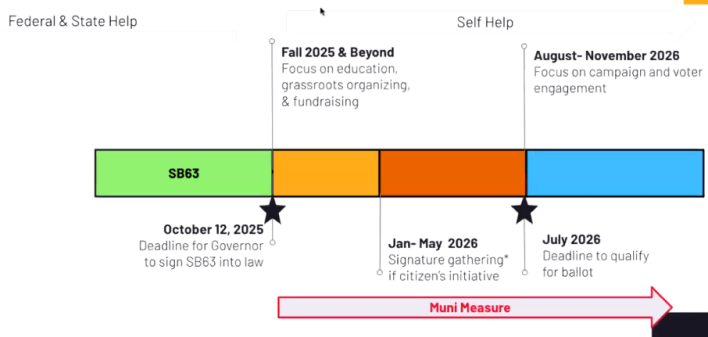Governor Gavin Newsom signed Senate Bill 63, the "Connect Bay Area Act," on Monday. This authorizes putting a sales-tax revenue measure on the ballot next year in counties around the Bay Area. If voters approve it, the measure will raise roughly $1 billion a year for operations, allowing the Bay Area's transit systems to maintain service. The legislation was authored by Senators Scott Wiener (D-SF) and Jesse Arreguín (D- Berkeley).
"The passage of SB 63 is an important milestone. We thank Senators Wiener and Arreguín for their hard work to get this through," wrote Transform's Abibat Rahman-Davies. "However, the real work now begins as we take transit funding to the voters next November."
The bill would allow for the tax to be placed on the ballot either by the Metropolitan Transportation Commission or through a qualified citizens’ initiative. If MTC does it, it then requires a two-thirds vote to pass in November. However, advocates hope to gather signatures and qualify it as a citizens' initiative, because that requires only a simple majority of votes to pass.
Neither route will be easy. Going by analysis forwarded by the San Francisco Transit Riders' Dylan Fabris, the citizens' initiative—the preferred strategy among advocates—requires an estimated 240,000 petition signatures. That's "less than one-third of the population of SF," quipped Transform's Zack Deutsch-Gross, adding that it's a little easier because there's no "individual county by county number we have to hit."
The signature campaign starts in January and the deadline is in July. Professional campaign staff is already on hire to see it through, explained advocates.

Whether through signatures or an MTC decision, one way or another, "The Connect Bay Area Act" will appear on ballots in San Francisco, Contra Costa, Santa Clara, San Mateo, and Alameda Counties. The default tax rate for the measure is ½-cent, with the exception that San Francisco may decide to set a 1-cent rate in that county to provide extra support for Muni.
Despite the remaining challenges, transit operators from BART, Muni, and other agencies celebrated the milestone. "Caltrain has been reinvented as a state-of-the-art rail system, delivering the best service this corridor has seen in its 161-year history," said Caltrain Executive Director Michelle Bouchard. “We are seeing the benefits every day with growing ridership, cleaner air, quieter trains, and less-congested roads. To sustain these benefits, it is essential that Caltrain be funded."
Even if everything works out and voters approve the funds, SB 63 isn't just a gimme. MTC will be required to conduct an independent third-party financial efficiency review of BART, MUNI, AC Transit, and Caltrain to identify cost-saving measures for those operators, explained Wiener's office. "After the assessment, the operators will be required to submit implementation plans to MTC detailing cost-efficiency measures they plan to implement."

According to an analysis from SPUR, without the funds, the effects will be devastating. For example, BART may have to cut up to 90 percent of its service, the equivalent of completely shutting down two of its five lines and reducing the number of trains it runs from 4,200 trains to just 500 trains per week.
Advocates reiterated that they are now focused on the upcoming fight to get the signatures and then the approval of the majority of voters in November 2026.
"This ballot measure is essential to keep transit running in the Bay Area and to continue progress toward a more rider-friendly, coordinated, affordable, accessible transit system," wrote Seamless Bay Area's Adina Levin. "We're looking forward to getting out into the community and spreading the word about what's at stake."
The governor also signed SB 79, which allows dense housing construction near transit. For a full breakdown on that and other bills, be sure to check out coverage in Streetsblog California.





